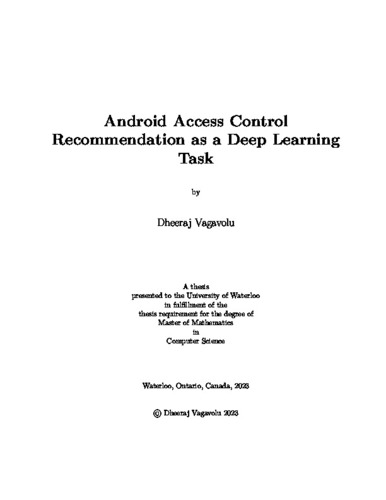UWSpace will be migrating to a new version of its software from July 29th to August 1st. UWSpace will be offline for all UW community members during this time.
Android Access Control Recommendation as a Deep Learning Task
| dc.contributor.author | Vagavolu, Dheeraj | |
| dc.date.accessioned | 2023-09-25 17:52:00 (GMT) | |
| dc.date.available | 2024-01-24 05:50:05 (GMT) | |
| dc.date.issued | 2023-09-25 | |
| dc.date.submitted | 2023-09-20 | |
| dc.identifier.uri | http://hdl.handle.net/10012/19936 | |
| dc.description.abstract | Android enforces access control checks to protect sensitive framework APIs. If not properly protected, framework APIs can open the door for malicious apps to access sensitive resources without having the necessary privileges. Unfortunately, as reported in the existing literature, such access control anomalies are prevalent in Android APIs, notably those introduced by customization parties. Therefore, various solutions have been proposed to detect anomalies, particularly those due to inconsistencies in the enforcement of access checks across the Android framework(s). The solutions can be largely divided into two categories: convergence-based techniques which rely on the convergence of two APIs on similar resources, and probabilistic approaches which incorporate additional hints in the form of manually defined structural and semantic code constructs. In this paper, we are motivated by the promising application of using code constructs, beyond convergence as proposed by the probabilistic approaches, to recommend access control enforcement and detect inconsistencies. Specifically, we propose a deep learning-based approach that aims to automatically learn the correspondence between various code constructs and access control requirements. To this end, we fine-tune CodeBert on statically derived features from the Android Open Source Project (AOSP). Our feature engineering process addresses various peculiarities that characterize Android implementations. The resulting fine-tuned model can be queried to recommend access control for vendor-customized APIs. The fine-tuned model achieves an accuracy of 93%, a precision of 91%, and a recall of 92% in the AOSP data. Additionally, our evaluation of custom ROMs shows that the model is able to not only rediscover previously reported inconsistencies but also discover new ones. | en |
| dc.language.iso | en | en |
| dc.publisher | University of Waterloo | en |
| dc.subject | Android Security | en |
| dc.subject | Deep Learning | en |
| dc.subject | Software Engineering | en |
| dc.title | Android Access Control Recommendation as a Deep Learning Task | en |
| dc.type | Master Thesis | en |
| dc.pending | false | |
| uws-etd.degree.department | David R. Cheriton School of Computer Science | en |
| uws-etd.degree.discipline | Computer Science | en |
| uws-etd.degree.grantor | University of Waterloo | en |
| uws-etd.degree | Master of Mathematics | en |
| uws-etd.embargo.terms | 4 months | en |
| uws.contributor.advisor | Nagappan, Meiyappan | |
| uws.contributor.advisor | Aafer, Yousra | |
| uws.contributor.affiliation1 | Faculty of Mathematics | en |
| uws.published.city | Waterloo | en |
| uws.published.country | Canada | en |
| uws.published.province | Ontario | en |
| uws.typeOfResource | Text | en |
| uws.peerReviewStatus | Unreviewed | en |
| uws.scholarLevel | Graduate | en |

